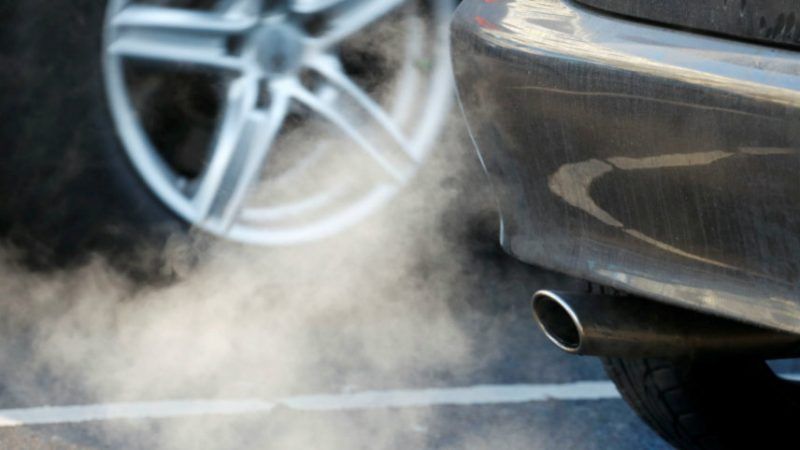Environmental Protection Agency
In the Age of Trump, Liberals Have Rediscovered the Value of Federalism
California might end up asking conservative judges to strike down federal rules for vehicle emissions.

Could California's liberal Democratic attorney general end up asking conservative justices on the U.S. Supreme Court to strike down the federal Clean Air Act as an unconstitutional infringement on states' rights?
It sure looks as though things are headed in that direction.
Anti-pollution laws—particularly the standards for automobile emissions—are the latest area where, because of the Trump administration, the left is discovering anew the advantages of devolving authority to state and local governments.
When we last peeked in on the emerging left-right potential alliance against an overly broad interpretation of the Interstate Commerce Clause of the Constitution, it had to do with Justice Clarence Thomas and Senator Elizabeth Warren pushing back against federal regulation of marijuana. Thomas and Warren both had a hard time seeing how the Constitution's grant of power to Congress to regulate commerce "among the several states" extended to preventing the small-scale cultivation or consumption of marijuana within a single state.
Auto emissions became the newest and perhaps the most heated front in the federalism fight earlier this month when the federal Environmental Protection Agency announced a "Make Cars Great Again" proposal. Part of that plan involves withdrawing a waiver the federal government had granted in 2013 that had allowed California to impose stricter emissions standards on new cars sold in the Golden State.
Why, you might wonder, does California even need to ask permission from Washington to impose such stricter standards? Why can't the state simply impose them on its own, without begging Washington for an okay?
The federal government's position is that the answer is the Clean Air Act. In 1967, when, because of Civil Rights, popular belief in the moral and practical efficacy of the expansion of federal power was at a high point, Congress passed what it called the National Emissions Standard Act. As it currently reads, the law contains a prohibition on the states: "No State or any political subdivision thereof shall adopt or attempt to enforce any standard relating to the control of emissions from new motor vehicles or new motor vehicle engines subject to this part. No State shall require certification, inspection, or any other approval relating to the control of emissions from any new motor vehicle or new motor vehicle engine as condition precedent to the initial retail sale, titling (if any), or registration of such motor vehicle, motor vehicle engine, or equipment."
There's a provision for a waiver to be granted under certain limited circumstances, but even so, the prohibition on the states is a pretty bold assertion of federal power. The Trump administration's intent to use that power has Californians across the political spectrum ticked off.
The former governor of California, Arnold Schwarzenegger, issued astatement saying, "I am sick and tired of these fake conservatives who believe in states' rights to make their own policies — as long as the state policy is to pollute more. If you want to clean up your air, they throw federalism right out the window."
"California Attorney General Xavier Becerra should fight for the state's right to combat air pollution," the San Jose Mercury News said in an editorial.
California's U.S. Senators, Kamala Harris and Dianne Feinstein, joined by 32 other senators, last week introduced a resolution "defending state authority under the Clean Air Act to protect their citizens from harmful air pollution." The resolution says Congress supports policies that will "recognize the rights and importance of the States in cooperative federalism to set and follow stronger vehicle emissions standards under the Clean Air Act if they so choose." Among those joining the Harris-Feinstein resolution are the Senate Democratic leader, Charles Schumer, and the independent socialist from Vermont, Bernie Sanders.
When Schumer, Sanders, and Schwarzenegger are all talking about "the rights…of the states," it's an interesting situation.
Some advocates reject the states' rights argument. Limiting California's waiver is "not a violation of federalism principles; it simply prevents unelected bureaucrats in Sacramento from dictating what kinds of cars the rest of America drives," writes Kenny Stein, the policy director of the Institute for Energy Research. Stein is a former aide to Senator Ted Cruz, Republican of Texas.
"Cars are sold in a national market and between travel and people relocating, cars move between states millions of times a year. It is not feasible for individual states to have separate standards for cars. Constitutionally, this is a clear matter of interstate commerce," Stein writes.
Practical answers to many of these federalism questions often avoid any principled or consistent rule-based system about what gets decided in Washington and what gets decided at the state level. Instead, they depend on which party is in power at what level at a particular time, and what they want. Whether the issue is abortion, gun control, marijuana, gay marriage, health insurance, or automobile emissions, politicians of both parties and plenty of voters, too, prize certain policy outcomes. Whether that outcome is imposed from Washington or from a state capital is a lesser concern.
That's too bad, because the Constitutional set-up, delegating limited and enumerated powers to the federal government while reserving the rest, in the Tenth Amendment, to the states and the people, has a certain genius to it. That genius has a way of making itself discovered when one doesn't agree with how things are going in Washington. But it is there all the time, no matter who is in power.
Ira Stoll is editor of FutureOfCapitalism.com and author of JFK, Conservative.


Show Comments (167)